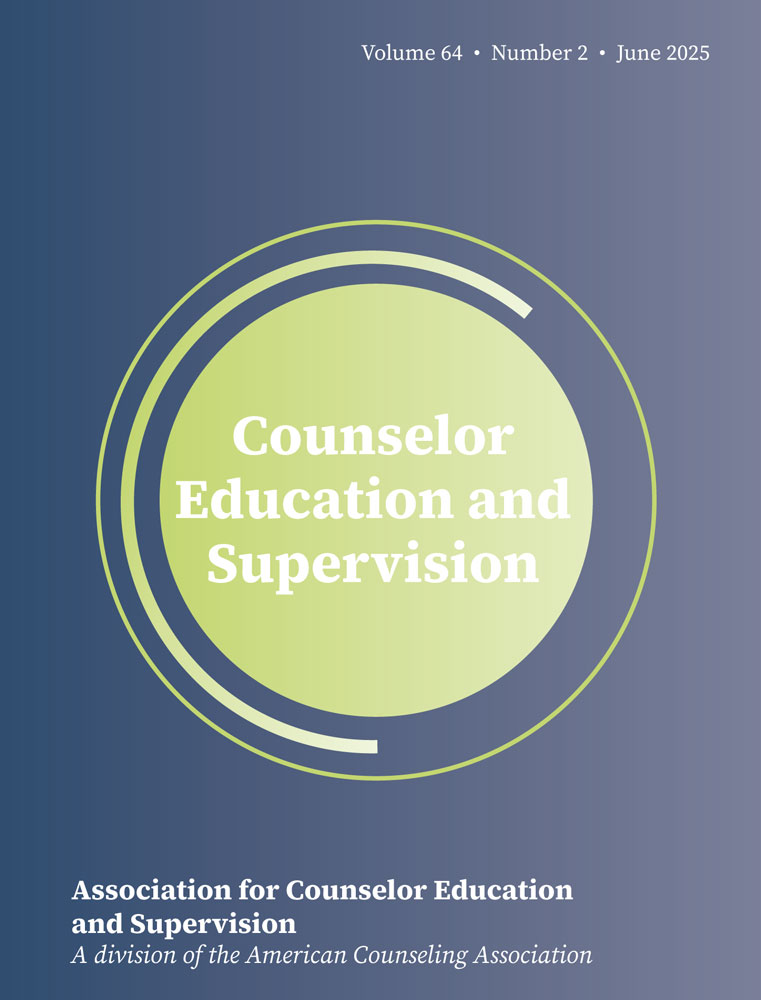Relationships and Collaboration: Engaging in Research With Marginalized Communities
Corresponding Author
Carlos P. Hipolito-Delgado
University of Colorado Denver, Denver, Colorado, USA
Correspondence: Carlos P. Hipolito-Delgado ([email protected])
Search for more papers by this authorJyotsana Sharma
Oklahoma State University, Stillwater, Oklahoma, USA
Search for more papers by this authorCorresponding Author
Carlos P. Hipolito-Delgado
University of Colorado Denver, Denver, Colorado, USA
Correspondence: Carlos P. Hipolito-Delgado ([email protected])
Search for more papers by this authorJyotsana Sharma
Oklahoma State University, Stillwater, Oklahoma, USA
Search for more papers by this authorABSTRACT
Drawing on decolonizing methods and relational–cultural theory, we argue for the importance of relationship building and collaboration in counselor education research. Based on our partnerships with refugees and migrants, survivors of interpersonal violence, and youth of color, we share concrete strategies for fostering relationships and collaboration in counseling research.
Conflicts of Interest
The authors declare no conflicts of interest.
References
- Beeman-Cadwallader, N., C. Quigley, and T. Yazzie-Mintz. 2012. “Enacting Decolonized Methodologies: The Doing of Research in Educational Communities.” Qualitative Inquiry 18, no. 1: 3–15. https://doi.org/10.1177/1077800411426414.
- Ben-Ari, A., and G. Enosh. 2013. “Power Relations and Reciprocity: Dialectics of Knowledge Construction.” Qualitative Health Research 23, no. 3: 422–429. https://doi.org/10.1177/1049732312470030.
- Bermúdez, J. M., B. A. Muruthi, and L. S. Jordan. 2016. “Decolonizing Research Methods for Family Science: Creating Space at the Center.” Journal of Family Theory and Review 8, no. 2: 192–206. https://doi.org/10.1111/jftr.12139.
- Cokley, K., and G. H. Awad. 2013. “In Defense of Quantitative Methods: Using the “Master's Tools” to Promote Social Justice.” Journal for Social Action in Counseling & Psychology 5, no. 2: 26–41. https://doi.org/10.33043/JSACP.5.2.26-41.
10.33043/JSACP.5.2.26-41 Google Scholar
- Comstock, D. L., T. R. Hammer, J. Strentzsch, K. Cannon, J. Parsons, and G. S. II. 2008. “Relational-Cultural Theory: A Framework for Bridging Relational, Multicultural, and Social Justice Competencies.” Journal of Counseling & Development 86, no. 3: 279–287.
- Cook, A. L., and P. Krueger-Henney. 2017. “Group Work That Examines Systems of Power With Young People: Youth Participatory Action Research.” The Journal for Specialists in Group Work 42, no. 2: 176–193. https://doi.org/10.1080/01933922.2017.1282570.
10.1080/01933922.2017.1282570 Google Scholar
- Cook, A. L., B. Ruiz, and J. Karter. 2019. ““Liberation Is a Praxis”: Promoting College and Career Access Through Youth Participatory Action Research.” The School Community Journal 29, no. 2: 203–224.
- Edirmanasinghe, N. A., I. P. Levy, K. Ieva, and S. Z. Tarver. 2022. “Youth-Led Participatory Action Research in School Counseling as a Vehicle for Antiracist SEL.” Theory Into Practice 61, no. 2: 199–211. https://doi.org/10.1080/00405841.2022.2036060.
- Frey, L. L. 2013. “Relational-Cultural Therapy: Theory, Research, and Application to Counseling Competencies.” Professional Psychology: Research and Practice 44, no. 3: 177–185. https://doi.org/10.1037/a0033121.
- Goforth, A. N., L. M. Nichols, J. Sun, A. Violante, K. Christopher, and N. Graham. 2022. “Incorporating the Indigenous Evaluation Framework for Culturally Responsive Community Engagement.” Psychology in the Schools 59, no. 10: 1984–2004. https://doi.org/10.1002/pits.22533.
- Hart, M. A., S. Straka, and G. Rowe. 2017. “Working Across Contexts: Practical Considerations of Doing Indigenist/Anti-Colonial Research.” Qualitative Inquiry 23, no. 5: 332–342. https://doi.org/10.1177/1077800416659084.
- Jordan, J. V. 2000. “The Role of Mutual Empathy in Relational/Cultural Therapy.” Journal of Clinical Psychology 56, no. 8: 1005–1016. https://doi.org/10.1002/1097-4679(200008)56:8<1005::AID-JCLP2>3.0.CO;2-L.
- Jordan, J. V. 2008. “Recent Developments in Relational-Cultural Theory.” Women & Therapy 31, no. 2–4: 1–4. https://doi.org/10.1080/02703140802145540.
- Jordan, J. V. 2017. “Relational–Cultural Theory: The Power of Connection to Transform Our Lives.” The Journal of Humanistic Counseling 56, no. 3: 228–243. https://doi.org/10.1002/johc.12055.
- Jordan, J. V. 2018. Relational-Cultural Therapy. American Psychological Association.
10.1037/0000063-000 Google Scholar
- Lavallée, L. F. 2009. “Practical Application of an Indigenous Research Framework and Two Qualitative Indigenous Research Methods: Sharing Circles and Anishnaabe Symbol-Based Reflection.” International Journal of Qualitative Methods 8, no. 1: 21–40. https://doi.org/10.1177/160940690900800103.
10.1177/160940690900800103 Google Scholar
- Mastuda, M., C. Lawrence, R. Delgado, and K. Crenshaw. 1993. Words That Wound: Critical Race Theory, Assaultive Speech, and the first amendment. Westview.
- Mbah, M. F., M. Bailey, and A. Shingruf. 2024. “Considerations for Relational Research Methods for Use in Indigenous Contexts: Implications for Sustainable Development.” International Journal of Social Research Methodology 27, no. 4: 431–446. https://doi.org/10.1080/13645579.2023.2185345.
- McGregor, H. E., B. Madden, M. Higgins, and J. Ostertag. 2018. “Braiding Designs for Decolonizing Research Methodologies: Theory, Practice, Ethics.” Reconceptualizing Educational Research Methodology 9, no. 2. https://doi.org/10.7577/rerm.2781.
10.7577/rerm.2781 Google Scholar
- Minton, C. A. B., M. M. Gibbons, and J. M. Hightower. 2021. “Community-Engaged Research and Evaluation in Counseling: Building Partnerships and Applying Program Evaluation.” Journal of Counseling & Development 99, no. 2: 210–220. https://doi.org/10.1002/jcad.12368.
- Pezalla, A. E., A. Scott, L. Nappa, and D. Hsieh. 2024. “Humanizing the Research Process: Collaborative Reflections on Prioritizing Research Participants' Agency, Trust, and Connection.” The Qualitative Report 29, no. 6: 1603–1620. https://doi.org/10.46743/2160-3715/2024.6631.
10.46743/2160?3715/2024.6631 Google Scholar
- Sánchez, F. J. 2019. “The Risks and Responsibilities of Conducting Research on Historically Marginalized Communities.” Archives of Sexual Behavior 48, no. 6: 1651–1653. https://doi.org/10.1007/s10508-019-01506-y.
- Sharma, J., C. P. McDonald, K. G. Bledsoe., et al. 2021. “Intersectionality in Research: Call for Inclusive, Decolonized, and Culturally Sensitive Research Designs in Counselor Education, Counseling Outcome Research and Evaluation.” Counseling Outcome Research and Evaluation 12, no. 2: 63–72. https://doi.org/10.1080/21501378.2021.1922075.
10.1080/21501378.2021.1922075 Google Scholar
- Singh, A. A., and L. Moss. 2016. “Using Relational-Cultural Theory in LGBTQQ Counseling: Addressing Heterosexism and Enhancing Relational Competencies.” Journal of Counseling & Development 94, no. 4: 398–404. https://doi.org/10.1002/jcad.12098.
- Smith, L. T. 2021. Decolonizing Methodologies: Research and Indigenous Peoples. 3rd ed. Zed Books.
10.5040/9781350225282 Google Scholar
- Snow, K. C., D. G. Hays, G. Caliwagan, et al. 2016. “Guiding Principles for Indigenous Research Practices.” Action Research 14, no. 4: 357–375. https://doi.org/10.1177/1476750315622542.
- Thambinathan, V., and E. A. Kinsella. 2021. “ Decolonizing Methodologies in Qualitative Research: Creating Spaces for Transformative Praxis.” International Journal of Qualitative Methods 20. https://doi.org/10.1177/16094069211014766.
10.1177/16094069211014766 Google Scholar
- Ticknor, A. S., and P. Averett. 2017. “Using Relational Cultural Theory in Education Research Design.” Qualitative Research Journal 17, no. 4: 373–384. https://doi.org/10.1108/QRJ-03-2017-0011.
10.1108/QRJ-03-2017-0011 Google Scholar




